|
The Third Society
(2001)
Director: J.
A.
Steel
Cast: Jacquelyn A. Ruffner, Russell Vann Brown, Sonya Eddy
Sometimes the only way that you are going to obtain your
dream is if you do everything by yourself. Take the case of Jacquelyn
A. Ruffner (a.k.a. J.A. Steel), the founder of Warrior Entertainment,
who was kind enough to send The Unknown Movies a screener and
press package for her directorial debut The Third Society.
A former production assistant skilled 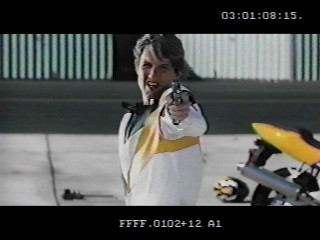 at Muay Thai
kickboxing and marksmanship, she found it extremely difficult to
convince any studio executives to accept her script as it was; even
after making several changes to try and accommodate their wishes, they
objected to trivial details such as the ethnicity and/or sex of several
of the script's characters. Frustrated, she finally decided to take the
plunge and make the movie herself, not only by digging into her own
pockets in order to put up most of the budget, but working on the movie
further than just writing the screenplay, acting in and directing the
nine day shoot, and then subsequently editing the movie herself. at Muay Thai
kickboxing and marksmanship, she found it extremely difficult to
convince any studio executives to accept her script as it was; even
after making several changes to try and accommodate their wishes, they
objected to trivial details such as the ethnicity and/or sex of several
of the script's characters. Frustrated, she finally decided to take the
plunge and make the movie herself, not only by digging into her own
pockets in order to put up most of the budget, but working on the movie
further than just writing the screenplay, acting in and directing the
nine day shoot, and then subsequently editing the movie herself.
Now typically, when a movie review's first paragraph
goes into telling of the rough time the filmmaker had in finding
backing for his or her project, and that the filmmaker subsequently
found he or she had to do it all herself, the inevitable following
paragraph that the critic writes is always in the vein of, "The
filmmaker was right all along, it's great, thank God s/he didn't
compromise their vision, and oh what a breath of fresh air it is in a
sea of Hollywood garbage." Well, with The Third Society,
we finally have an exception to that rule. To put it bluntly, it's not
a great film. Well, it is a pretty good movie? Uh... no. Well, is it a
miss, but one that shows promise? Um... oh dear. I'm having a hard time
trying to find something nice to say about the end results. Well, here
is one good thing I can say about it: While there have been countless
people over the years who have vowed to make a movie one way or the
other, Ruffner is one of the few who actually took the bull by the
horns and completed her movie. Not a good movie, but a movie
all the same.
There is another positive thing I can say about this
movie - while hundreds of other ultra-independent filmmakers have
scrimped and saved in order to make either a cynical and depressing
drama or a wisecracking comedy filled with young adults making easy pop
culture references for the festival circuit, Ruffner is one of the few
filmmakers in this category who actually made an action movie.
(Technically, it's an action movie, but I'll get into that later.) An
action movie with a plot that has elements action fans will recognize
from a number of other action movies, but an action movie all the same.
Ruffner plays Alexandra Cassandra Jones, a hard-edged Los Angeles
policewoman. Somewhere in Asia twenty five years earlier, when she was
just a nine year-old child, she saw both of her parents gunned down by
Dragon, a big-time Asian drug lord. Apparently, in whatever country
this took place (the production notes say Hong Kong, though I don't
recall the movie saying this or any other location), there are laws
against children testifying, because (apparently) Dragon is never
arrested and brought to trial. Since Jones' parents apparently were
U.S. government agents, the U.S. government then puts Jones and her
sister Erica into hiding in Thailand - an odd choice for two American
children, especially when you consider the strong possibility that a
major drug lord like Dragon would have operations in Thailand.
Anyway, Jones (apparently) stays in Thailand well into becoming an
adult, and (apparently) learns Muay Thai kickboxing along the way,
though all that we see of her training consists only of her jogging,
bathing in mountain streams, and making kicking motions towards trees
in the jungle. She eventually goes back to the 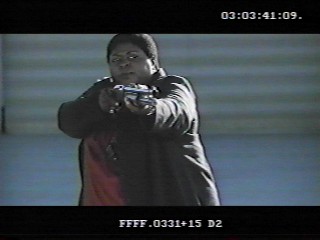 U.S., where she is
hired by the L.A.P.D. (apparently) on the basis of a phone call out of
the blue. Once a cop, she (apparently) makes a conscious decision to
strike back at Dragon. In a sequence equally confusing as the ones
preceding it, she (apparently) makes a successful raid one of Dragon's
L.A. drug operations all by herself. Sounds impressive, but the way
it's depicted, this drug operation was (apparently) only guarded
by one man firing a gun, a few others who run around with guns (though
don't actually fire them), and another guy that Jones kickboxes for a
few seconds. U.S., where she is
hired by the L.A.P.D. (apparently) on the basis of a phone call out of
the blue. Once a cop, she (apparently) makes a conscious decision to
strike back at Dragon. In a sequence equally confusing as the ones
preceding it, she (apparently) makes a successful raid one of Dragon's
L.A. drug operations all by herself. Sounds impressive, but the way
it's depicted, this drug operation was (apparently) only guarded
by one man firing a gun, a few others who run around with guns (though
don't actually fire them), and another guy that Jones kickboxes for a
few seconds.
Whether there were actually more men there or not, this drug bust
definitely pisses off Dragon, and he subsequently plans to kill two
birds with one stone by getting revenge and compensation at the same
time. His goons subsequently kidnap Erica, who is now a banker. They
force her to electronically transfer one billion dollars in securities
to Dragon's account - apparently, this was the value of Dragon's drugs.
(He had one billion dollars worth of drugs? And in one
location?) Since the transaction needs 24 hours to be fully
processed, he needs to keep Erica alive for that long, and that's how
long Jones has to save her... apparently. You see, near the end of the
movie, even after the transaction has been fully processed, Dragon
keeps Erica alive for no apparent reason. Just goes to show that even a
scummy drug dealer like Dragon can have a soft spot. (Apparently, that
is.)
Before I get more into the puzzling plot and the puzzling way it is
executed, let me first comment on the performance of lead actress
Ruffner. You might think that since she took on all the key roles of
the movie's production, the results would be an embarrassing vanity
project in the vein of someone like David Heavener. Refreshingly, this
is not the case here; Ruffner devotes a lot of time to the other main
characters, as well to scenes where her character does not appear. But
in the end, this focus ultimately ends up backfiring on the movie;
Ruffner spends so much time on other characters and events, that she
forgets to not only give herself enough time on the screen, but enough
to do in this time so that she can become a strong enough lead
character.
For a woman who in real life is skilled in the martial arts, motorbike
racing, and marksmanship, she doesn't give her Jones character that
much to do; aside from those few kicks at that aforementioned drug
bust, there are only a few more seconds of martial arts in the movie. A
few scenes where she races a motorbike come across as just racing from
point A to point B, with no feeling of urgency or danger in them. Most
of the action she's given herself is simply shooting a gun in a very
ordinary and generic fashion. (Incidentally, I've pretty much described
all of the little action to be found in this movie.) Also, Ruffner
isn't able to give Jones that much of an impression in whatever 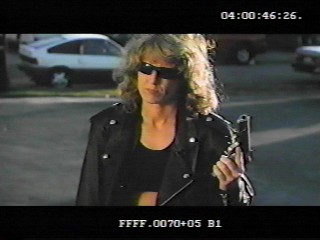 she is doing in her appearances.
As I mentioned, the action is quite sparse, though there are sometimes
other factors that distance ourselves from her actions, not just the
distance that Jones seems to be frequently from the camera. Being
completely covered by a motorbike helmet and uniform several times
makes us wonder if there's a stuntman under there, for example. But she
also doesn't give Jones that much dialogue, and she leaves a lot of her
character's personality to be created by narration - narration that is
provided by another character. she is doing in her appearances.
As I mentioned, the action is quite sparse, though there are sometimes
other factors that distance ourselves from her actions, not just the
distance that Jones seems to be frequently from the camera. Being
completely covered by a motorbike helmet and uniform several times
makes us wonder if there's a stuntman under there, for example. But she
also doesn't give Jones that much dialogue, and she leaves a lot of her
character's personality to be created by narration - narration that is
provided by another character.
By the end of the movie, I was starting to wish that Ruffner had gone
down the David Heavener route. The results may have come across as
being somewhat self-indulgent, but the movie would probably have been
more lively. Though Ruffner does occasionally shows signs that she has
the potential to be the rough and tough heroine a movie like this
needs, in the end I find it hard to judge her overall performance in
this movie because she just doesn't have that much to do. At least she
no worse or better than just about all her co-stars, who don't really
make a strong impression for one reason or another. The lone exception
is Sonya Eddy, who eventually appears as the police captain (and with
her appearance, finally makes it clear just who has been narrating all
of this time.) She has a commanding voice, and she puts some spunk into
her limited role.
While I'm on that positive note, I might as well go into what else I
enjoyed in the movie. There is some effective music, a kind you don't
usually hear in an action movie, though it sure loses its effect by the
time you hear those same bars being played for the fifth or so time.
Also, there is some good photography, with the jungle footage looking
nice, as well as some individual shots that just look cool, especially
with the careful direction of the actors and props in these shots. Some
of these shots use remote control helicopters ("Coptervision",
according to the press package), and it's effective when Ruffner uses
it to photograph a fast moving sequence taking place over a wide area -
though not so effective when used to photograph a martial arts fight
from a distance. It's clear from the cinematography and mood of some
scenes that Ruffner has been influenced by Hong Kong cinema, which does
give the movie a little different feel from many American action
movies. (Pity that this Asian influence didn't also extend to the
action sequences.)
And that's about all I can think of that's good to say
about The Third Society. What's now left is to talk
about its faults - and I will have to restrain myself from doubling the
intended length of this review when getting into this. Most of what I
found fault with in this movie boils down to how it was edited. The bad
nature of this editing gives you the idea that perhaps Ruffner wasn't
able to shoot 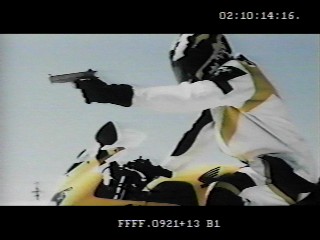 everything she intended. Throughout the movie,
scenes suddenly start up with no warning or advance notice, and often
start in what seems to be the middle of the sequence. It's usually very
bewildering, and you have to use information that is revealed
subsequently, plus your own judgment, to figure out just what was
happening at that moment. This feeling of missing footage also extends
to scenes that make more sense; some examples include a few times when
footage gets reused, as well as several conversations between two
people where the camera stubbornly focuses on just one of the speakers'
faces, without ever cutting in any studious or reaction shots of the
other speaker. everything she intended. Throughout the movie,
scenes suddenly start up with no warning or advance notice, and often
start in what seems to be the middle of the sequence. It's usually very
bewildering, and you have to use information that is revealed
subsequently, plus your own judgment, to figure out just what was
happening at that moment. This feeling of missing footage also extends
to scenes that make more sense; some examples include a few times when
footage gets reused, as well as several conversations between two
people where the camera stubbornly focuses on just one of the speakers'
faces, without ever cutting in any studious or reaction shots of the
other speaker.
Even in scenes where there was definitely more footage for the editor
to choose from have a peculiar nature to them. There is one sequence
that does start out with a lack of footage - a jet is seen slowly
taxiing down a runway, and then a few seconds later we see it flying
high in the sky about a mile away. But it's what happens after that
that is more puzzling. Seeing the jet flying away, Jones commandeers a
helicopter to chase after the jet, and we get several minutes of Jones
cruising the skies while her chief keeps radioing her to land. Finally
she does. Since this helicopter scene does nothing for the plot, you
have to ask yourself why Ruffner didn't just write out this sequence,
and used the saved money to shoot the jet picking up speed and taking
off.
Another strange presentation comes earlier, when Erica is kidnapped.
During this sequence, the movie suddenly cuts to Jones having a
shootout on a sailboat. (We eventually learn later that Jones lives on
this sailboat, and that one of Dragon's goons was sent to kill her.)
During the struggle, Jones and the goon fall off the boat and sink
beneath the waves, and they don't surface. We cut back to Erica being
forced to make the security transfer. We cut back to the still waters
of the ocean. We cut back to Erica making the transfer. We cut back to
the still waters of the ocean. We cut back to Erica making the
transfer. We cut back to the still waters of the ocean. We cut back to
Erica making the transfer. We cut back to the still waters of the
ocean. We.....
Though most of the negative side of the movie can be attributed to the
editing, there are also moments that will remind viewers of the work of
famous directors - not the likes of James Cameron or Sam Peckinpah, but
directors like Doris Wishman and Ed Wood. The former comes with the
post-dubbing of dialogue and sound effects; though these things might
be corrected before the movie gets its commercial release, the screener
I watched had gun battles where you don't hear all the gunshots, and
some fight sequences where the punches sound like balloon pops.
Hopefully some of the looping will be redone as well, because it's
quite obvious at times when dialogue has 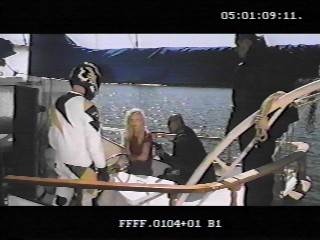 been dubbed over,
even when the characters' mouths aren't showing. The spirit of Wood is
alive with stuff like some cornball narration ("It was a war. An unholy
war. A war between good and evil, right and wrong. Between the darkness
that threatens to swallow the light of one's soul, and the
righteousness of the dawn.") and a scene on a sailboat where you see
Ruffner's shadow peeking into the frame while she waits for her cue to
walk onto the boat, as if she had just been walking down the dock
seconds before. (Though to be fair, the screener was letterboxed, and
the movie may be intended to be released in a full-screen format.) been dubbed over,
even when the characters' mouths aren't showing. The spirit of Wood is
alive with stuff like some cornball narration ("It was a war. An unholy
war. A war between good and evil, right and wrong. Between the darkness
that threatens to swallow the light of one's soul, and the
righteousness of the dawn.") and a scene on a sailboat where you see
Ruffner's shadow peeking into the frame while she waits for her cue to
walk onto the boat, as if she had just been walking down the dock
seconds before. (Though to be fair, the screener was letterboxed, and
the movie may be intended to be released in a full-screen format.)
Despite making an inauspicious motion picture debut, I don't think we
have seen the last of Jacquelyn Ruffner. It's evident in the production
notes, and even in the movie itself, that this is one determined woman
who really fights to complete her dreams - an attribute that we really
need to see more of. I'm sure she'll make another movie, and I would be
interested to see what her next effort is like. It can't be any worse
than this; after hitting so low the first time out, she has nowhere to
go but up.
Also reviewed at: Cold Fusion
Video
Check for availability on Amazon (DVD)
See also: Angel Of Fury, Bury Me An Angel, The
Stranger
|

 at Muay Thai
kickboxing and marksmanship, she found it extremely difficult to
convince any studio executives to accept her script as it was; even
after making several changes to try and accommodate their wishes, they
objected to trivial details such as the ethnicity and/or sex of several
of the script's characters. Frustrated, she finally decided to take the
plunge and make the movie herself, not only by digging into her own
pockets in order to put up most of the budget, but working on the movie
further than just writing the screenplay, acting in and directing the
nine day shoot, and then subsequently editing the movie herself.
at Muay Thai
kickboxing and marksmanship, she found it extremely difficult to
convince any studio executives to accept her script as it was; even
after making several changes to try and accommodate their wishes, they
objected to trivial details such as the ethnicity and/or sex of several
of the script's characters. Frustrated, she finally decided to take the
plunge and make the movie herself, not only by digging into her own
pockets in order to put up most of the budget, but working on the movie
further than just writing the screenplay, acting in and directing the
nine day shoot, and then subsequently editing the movie herself. U.S., where she is
hired by the L.A.P.D. (apparently) on the basis of a phone call out of
the blue. Once a cop, she (apparently) makes a conscious decision to
strike back at Dragon. In a sequence equally confusing as the ones
preceding it, she (apparently) makes a successful raid one of Dragon's
L.A. drug operations all by herself. Sounds impressive, but the way
it's depicted, this drug operation was (apparently) only guarded
by one man firing a gun, a few others who run around with guns (though
don't actually fire them), and another guy that Jones kickboxes for a
few seconds.
U.S., where she is
hired by the L.A.P.D. (apparently) on the basis of a phone call out of
the blue. Once a cop, she (apparently) makes a conscious decision to
strike back at Dragon. In a sequence equally confusing as the ones
preceding it, she (apparently) makes a successful raid one of Dragon's
L.A. drug operations all by herself. Sounds impressive, but the way
it's depicted, this drug operation was (apparently) only guarded
by one man firing a gun, a few others who run around with guns (though
don't actually fire them), and another guy that Jones kickboxes for a
few seconds. she is doing in her appearances.
As I mentioned, the action is quite sparse, though there are sometimes
other factors that distance ourselves from her actions, not just the
distance that Jones seems to be frequently from the camera. Being
completely covered by a motorbike helmet and uniform several times
makes us wonder if there's a stuntman under there, for example. But she
also doesn't give Jones that much dialogue, and she leaves a lot of her
character's personality to be created by narration - narration that is
provided by another character.
she is doing in her appearances.
As I mentioned, the action is quite sparse, though there are sometimes
other factors that distance ourselves from her actions, not just the
distance that Jones seems to be frequently from the camera. Being
completely covered by a motorbike helmet and uniform several times
makes us wonder if there's a stuntman under there, for example. But she
also doesn't give Jones that much dialogue, and she leaves a lot of her
character's personality to be created by narration - narration that is
provided by another character. everything she intended. Throughout the movie,
scenes suddenly start up with no warning or advance notice, and often
start in what seems to be the middle of the sequence. It's usually very
bewildering, and you have to use information that is revealed
subsequently, plus your own judgment, to figure out just what was
happening at that moment. This feeling of missing footage also extends
to scenes that make more sense; some examples include a few times when
footage gets reused, as well as several conversations between two
people where the camera stubbornly focuses on just one of the speakers'
faces, without ever cutting in any studious or reaction shots of the
other speaker.
everything she intended. Throughout the movie,
scenes suddenly start up with no warning or advance notice, and often
start in what seems to be the middle of the sequence. It's usually very
bewildering, and you have to use information that is revealed
subsequently, plus your own judgment, to figure out just what was
happening at that moment. This feeling of missing footage also extends
to scenes that make more sense; some examples include a few times when
footage gets reused, as well as several conversations between two
people where the camera stubbornly focuses on just one of the speakers'
faces, without ever cutting in any studious or reaction shots of the
other speaker. been dubbed over,
even when the characters' mouths aren't showing. The spirit of Wood is
alive with stuff like some cornball narration ("It was a war. An unholy
war. A war between good and evil, right and wrong. Between the darkness
that threatens to swallow the light of one's soul, and the
righteousness of the dawn.") and a scene on a sailboat where you see
Ruffner's shadow peeking into the frame while she waits for her cue to
walk onto the boat, as if she had just been walking down the dock
seconds before. (Though to be fair, the screener was letterboxed, and
the movie may be intended to be released in a full-screen format.)
been dubbed over,
even when the characters' mouths aren't showing. The spirit of Wood is
alive with stuff like some cornball narration ("It was a war. An unholy
war. A war between good and evil, right and wrong. Between the darkness
that threatens to swallow the light of one's soul, and the
righteousness of the dawn.") and a scene on a sailboat where you see
Ruffner's shadow peeking into the frame while she waits for her cue to
walk onto the boat, as if she had just been walking down the dock
seconds before. (Though to be fair, the screener was letterboxed, and
the movie may be intended to be released in a full-screen format.)